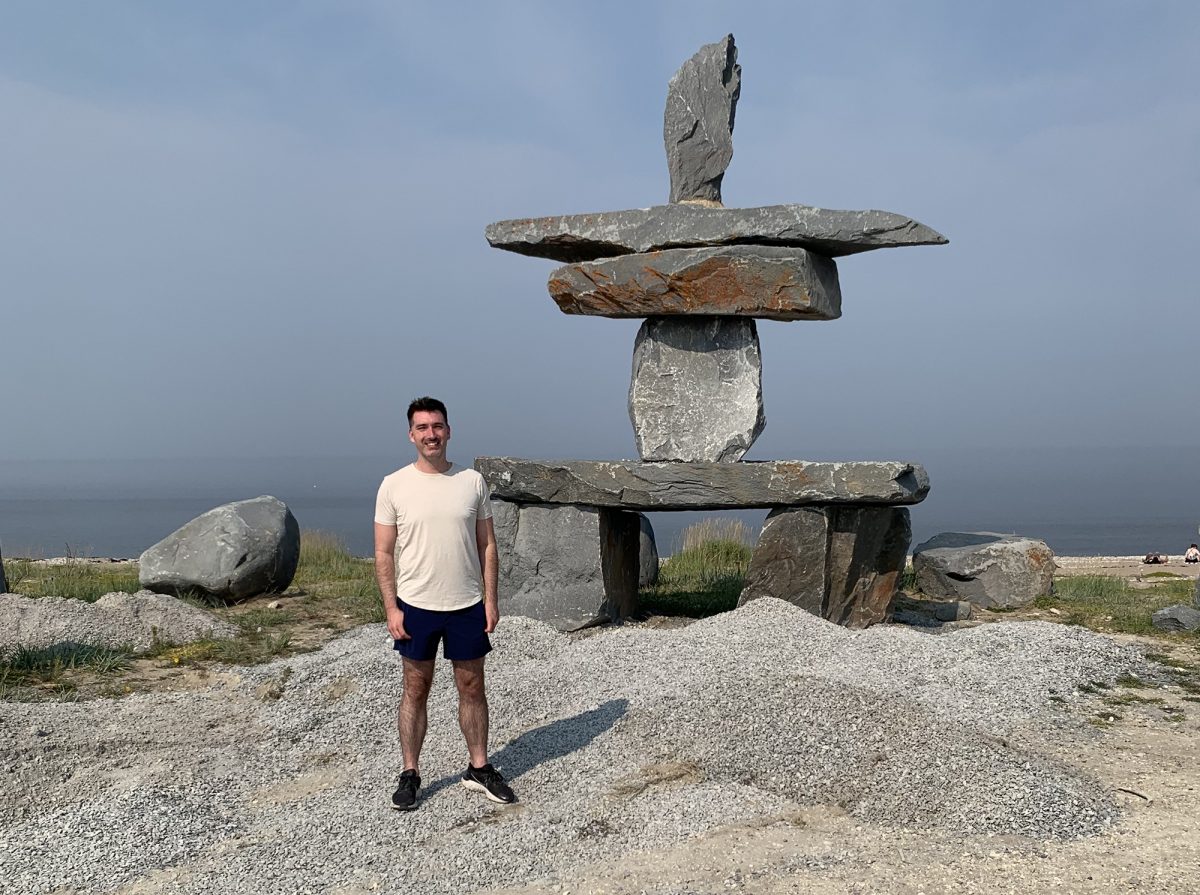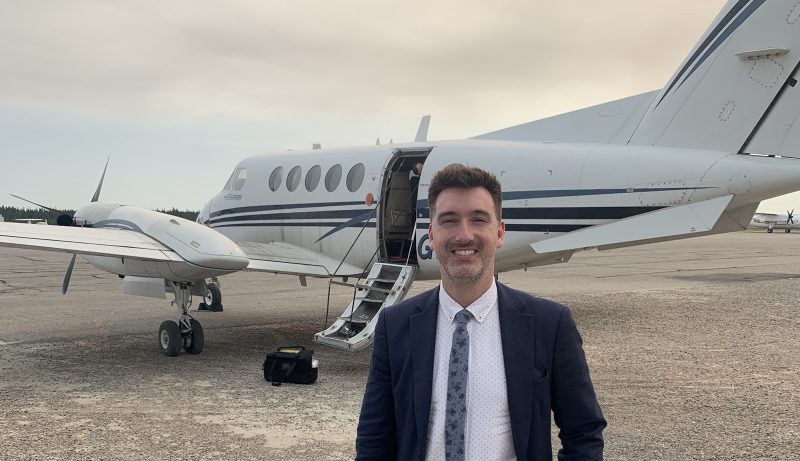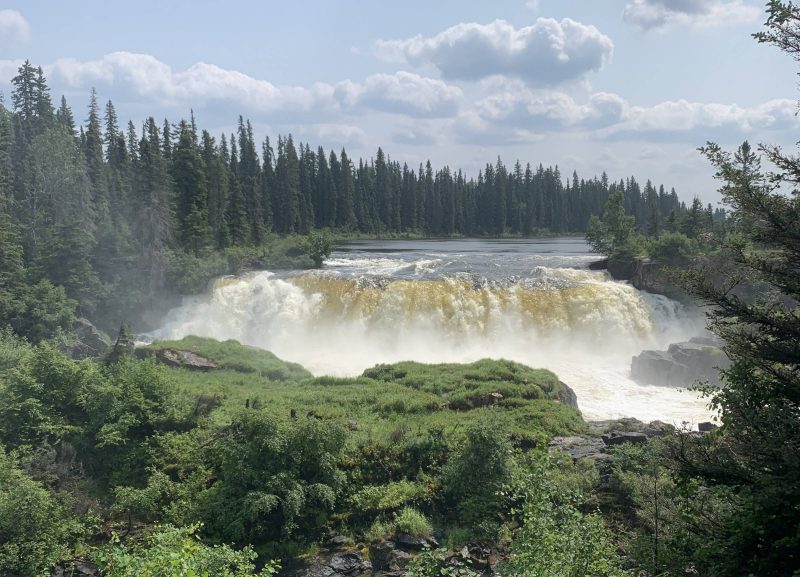
Brandon Leverick, 3L visited Churchill as part of his Northern Externship at the UMCLC this summer.
Expanding experiential legal training northwards
Law student reports on inaugural Northern Externship
The Faculty of Law expanded its externship opportunities this year to include a first-ever for-credit Northern Externship. Third-year law student, Brandon Leverick was the ideal candidate for the job, and recently returned from Thompson where he spent the summer flying around northern Manitoba to help provide legal services to remote communities.
Leverick was based at the Legal Aid Manitoba Northern Area Office in Thompson, MB, working under the supervision of staff lawyer Ian McAmmond and Supervising Attorney, Mario Santos. At Robson Hall, Leverick reported back to Allison Fenske [LLB/2007], the Faculty of Law’s Clinical Counsel and Director of the University of Manitoba’s Community Law Centre (aka the Legal Aid Clinic, or UMCLC).
Fenske, who previously worked as a lawyer at Legal Aid’s Public Interest Law Centre, said, “UMCLC is pleased to support the Northern Externship. Thompson is a dynamic place where students can build important legal skills while also contributing to increasing access to justice for Northern communities. There is no shortage of incredible opportunities to be had when students look beyond Winnipeg’s perimeter.”
Upon returning to Winnipeg to finish law school, Leverick kindly shared his summer experiences, and some stunning photos of Northern Manitoba.
How did you learn about this externship opportunity and what motivated you to apply for it?
I learned about this externship opportunity from Mike Walker, the former supervisor of the UMCLC law clinic. Both Mike and the current UMCLC supervisor, Allison Fenske, encouraged me to take on this opportunity as my understanding is it was the first time this was offered at Robson Hall. I already have a keen interest in criminal law from my time at UMCLC and the opportunity to work up north would have been an amazing experience to see how the law works in the farthest-reaching corners of the province. I also previously worked up north and was excited to go back to a place I had fond memories of. The externship, combined with a research paper, counts as 15 credits as well which is an entire semester of law school where you get to apply your legal knowledge in a courtroom!
Where were you based and in which communities did you work? Did you have to travel around – and how (planes, trains, automobiles, boat)?
I was based out of the Thompson Legal Aid office. The Thompson Court serves around 15 circuit communities. Most of these communities are far away from Thompson, with only two being circuits to which you drive to. I had the opportunity to attend court in Nelson House, Norway House, Split Lake, Shamattawa, and Churchill. Some circuits, we drove to, like Nelson House and Split Lake. Others, the court party would all fly together on a tiny plane like to Churchill and Shamattawa! Often, court would be held in a facility that was available like the Legion or the band hall. It was definitely the most interesting commute to work I’ve had in awhile!

Brandon Leverick, 3L, commuting to work during his summer job: an externship with the Legal Aid Manitoba Thompson office.
What sort of tasks were you given to do?
Every day, you could find me assisting duty counsel in the Thompson Court House with bails and remands. Sometimes, I would assist people who wanted to resolve their matters with a disposition. The lawyers who supervised me also got me involved with some files where I drafted motions and wrote research memoranda. While I was on circuit, I often assisted with first appearances where I took Legal Aid applications and, if individuals wanted to resolve, assisted them as duty counsel.
I also learned a lot about the realities of the north and access to justice issues Indigenous peoples face on a daily basis. This, for me, further grounded why law schools need courses such as Indigenous Methodologies and Perspectives. – Brandon Leverick, 3L
What do you think you learned by the end compared to what you knew when you started?
I learned so much about the bail process. Applying the legal tests on what grounds someone can be denied for bail and devising appropriate bail plans to address these concerns was something I had no experience with before the summer. I also learned a lot about the realities of the north and access to justice issues Indigenous peoples face on a daily basis. This, for me, further grounded why law schools need courses such as Indigenous Methodologies and Perspectives. I also learned a lot of problem-solving skills. I think the justice system as a whole is doing what they can with little resources, but this is especially evident in the north. The lawyers who work up there really go above and beyond to do what they can with what they have, and then some more, because they really do care about their community.

A glimpse of Pisew Falls on the Grass River, second highest waterfall in Manitoba, 74km south of Thompson. Photo by Brandon Leverick, 3L.
Are there any courses you recommend students take before embarking on this externship?
I highly recommend students consider volunteering for the UMCLC law clinic if they are thinking about taking on this externship. I would also recommend they take courses in criminal law, such as Criminal Justice, Family Law, and Indigeneity and Charter Issues in Criminal Law. Ultimately, I think extracurricular volunteering where you can practice your interviewing, writing, research, and issue-spotting skills will be best preparation for the Northern Externship. I would highly recommend anyone who wants practical experience to consider this opportunity!






